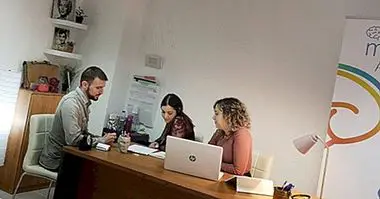How is the first session of online psychotherapy?
Increasingly, online psychotherapy is emerging as the favorite choice of many clients and patients who welcome the advantages of this modality of psychological intervention.
It is not strange, given that the freedom it provides and the ease with which you can access the psychologist's consultation through the Internet they are factors from which many benefit. The limitations of time and space do not have to weigh us down when it comes to accessing psychotherapy services.
However, it is common that the idea of attending therapy through the Internet is somewhat confusing for those who consider opting for this option and are not very familiar with the options provided by the distance format supported by new technologies of interconnection. Let's see, then, how is the first session of online therapy .
- Related article: "How does online psychotherapy work?"
This is how the first online psychotherapy session begins
In the beginning, what distinguishes online psychotherapy from face-to-face psychotherapy is minimal. The contact between the therapist and the patient is fundamentally the same in both cases, given that most of the first steps at the moment of establishing communication occur on the Internet, either through the psychologist's website or through a psychologists directory. It is, in short, an email message or a phone call.
From there, the professional can consider the possibility of performing therapy online or in person , or it may also be the case that the potential patient expresses the intention to use only the online format.
In any case, do not always have to take into account that although you will receive online care, the service will be provided by a mental health professional clearly identified by name, surname and number of collegiate, not by a computer program or by a virtual interface alien to any human component.

Miguel Ángel Rizaldos, expert in online therapy with more than 25 years of experience and one of the pioneers in the use of this modality in Spain, indicates that this type of therapy is subject to the same quality standards as face-to-face physical consultation , and the same psychologists that can attend through the Internet are trained to practice face to face : the type of service is the same, and only changes the medium in which it is provided.
At the same time that the day and time of the first session of online psychological therapy is established, the patient receives some simple instructions to know what to do to start the session, which will take place by videoconference.
Exploration of the problem
Once the connection started, both the professional and the patient have on their computer screens a live image of what the other person's webcam captures , which points to the face: both the image and the sound.
Videoconferencing is the basis of online therapy, as it provides a context in which both parties can share elements of verbal and non-verbal communication, and there is also the possibility of sharing audiovisual content in real time (which may be useful in several phases of therapy).
In the first minutes of the start of what can technically be considered the first session of online psychotherapy, formal presentations are made. This phase is intended to create a communicative flow in which patients feel comfortable. Then, the patient, invited by the professional, explains what they are looking for or what their problem is.
This explanation does not have to be very prepared, and it can be relatively spontaneous and improvised, since later patient and therapist will negotiate the establishment of much more specific objectives.
In any case, it is important to note that these explanations are not given "on camera", since the session takes place not looking at the camera (which would be uncomfortable for many people, but looking at the therapist.) The online format itself is designed so that be an interaction very similar to the one that would occur while both were in the same room .
On the other hand, although in this phase of the therapy the patient has a lot of information about the case and the therapist does not have it yet, the latter usually intervenes frequently to help the patient structure their explanations. If necessary, the patient can share videos or photographs to provide more information about their case, as long as these documents do not violate the privacy of others.
- Maybe you're interested: "Types of psychological therapies"
A remote but not impersonal session
Most of this first session by videoconference, which usually lasts less than an hour, is dedicated to the patient explaining and communicating their concerns and aspirations related to the problem or the need to treat.
The professional acts as a guide to make these explanations go to one or another area of life, but does not give orders or abruptly interrupts the other person without giving the opportunity to continue explaining. Miguel Ángel Rizaldos points out that the fact that there is a screen in between is in no way an excuse to offer a more distant and impersonal treatment to the patient, but a resource to be used to allow a type of communication that better fits the availability from both sides.
Of course, psychologists adopt a professional role and do not try to pass themselves off as the patient's friends, but that does not mean that they do not show empathy and closeness, nor that they make relevant decisions in a totally unilateral manner. The creation of consensual therapeutic commitments is always sought , that allow to advance the therapy. Thus, the first session of online therapy ends by pointing to the objectives of the next session, which will be a recapitulation of what has been put in common in the first and delves into proposals to start walking towards the objectives set.
Bibliographic references:
- Zack, Jason; Stricker, George (2004). Kraus, Ron, ed. Online counseling: a handbook for mental health professionals. Amsterdam: Academic.
- Zelvin, E. (2004). Online Counseling Skills Part I: Treatment Strategies and Skills for Conducting Counseling Online. Academic Press.



















